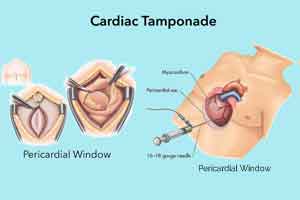- Home
- Editorial
- News
- Practice Guidelines
- Anesthesiology Guidelines
- Cancer Guidelines
- Cardiac Sciences Guidelines
- Critical Care Guidelines
- Dentistry Guidelines
- Dermatology Guidelines
- Diabetes and Endo Guidelines
- Diagnostics Guidelines
- ENT Guidelines
- Featured Practice Guidelines
- Gastroenterology Guidelines
- Geriatrics Guidelines
- Medicine Guidelines
- Nephrology Guidelines
- Neurosciences Guidelines
- Obs and Gynae Guidelines
- Ophthalmology Guidelines
- Orthopaedics Guidelines
- Paediatrics Guidelines
- Psychiatry Guidelines
- Pulmonology Guidelines
- Radiology Guidelines
- Surgery Guidelines
- Urology Guidelines
Cardiac Tamponade: Causes, Symptoms, Treatment

Cardiac tamponade is a medical emergency in which blood or fluids fill the space between the sac that covers the heart and the heart muscle.
This places extreme pressure on the heart. The pressure prevents the heart from expanding fully and functioning properly. Hence the heart can't pump enough blood to the rest of the body, which leads to organ failure, shock, and even death.
"There are many causes for cardiac tamponade. It could be caused due to malignancies, especially breast cancer or lung cancer, infectious agents such as viruses, bacteria, or fungal infections, connective tissue diseases like rheumatoid arthritis, aortic aneurysm or dissection, and chronic kidney disease. It could also arise as a side effect from medical procedures such as radiation therapy, accidental perforation during cardiac catheterization, angiography, or post cardiovascular surgery," said Dr Kumar Kenchappa, Consultant, Interventional Cardiologist, Gleneagles Global Hospitals, Richmond Road.
The symptoms vary with the underlying cause and how fast the tamponade has developed. It may present sub acutely with anxiety, fatigue, altered mental status and edema. Patient can also experience shortness of breath, rapid heart rate and rapid breathing.
Cardiac tamponade often has three signs, commonly known as Beck's triad. They include:
• Low blood pressure and weak pulse
• Distended neck veins
• Rapid heartbeat combined with soft heart sounds
"Presence of these three symptoms helps the medical professional suspect the presence of cardiac tamponade. This is confirmed by medical tests such as ECG, Echocardiography, and Chest X-rays. Imaging tests like an MRI or CT scan can help the doctor get a more accurate idea of the condition and appropriately evaluate its severity," added Kenchappa.
Cardiac tamponade is a medical emergency that requires hospitalization. The treatment of cardiac tamponade has two purposes: relieving of pressure on the heart and treatment of the underlying condition. In order to manage the emergency situation and relieve the pressure on the heart, a procedure called pericardiocentesis is performed.
The safest way of performing this procedure is by an emergency subxiphoid percutaneous drainage under the guidance of an echocardiogram. If the patient is stable, the pericardiocentesis can be done under the fluoroscopic guidance and a pig tail catheter can be left in place to drain the fluid in case there is any further accumulation.
Once the emergency situation has been managed, determination and treatment of the underlying cause will prevent further episodes of tamponade.

Disclaimer: This site is primarily intended for healthcare professionals. Any content/information on this website does not replace the advice of medical and/or health professionals and should not be construed as medical/diagnostic advice/endorsement or prescription. Use of this site is subject to our terms of use, privacy policy, advertisement policy. © 2020 Minerva Medical Treatment Pvt Ltd